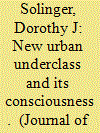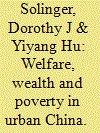|
|
|
Sort Order |
|
|
|
Items / Page
|
|
|
|
|
|
|
| Srl | Item |
| 1 |
ID:
114801


|
|
|
|
|
| Publication |
2012.
|
| Summary/Abstract |
This paper investigates whether the 22 million or so urban recipients of the Minimum Livelihood Guarantee (the zuidi shenghuo baozhang), whose per capita family income falls below a locally set poverty line, can be called a 'class'. It also explores if they experience 'class consciousness'. It draws on theoretical writings on class and class consciousness, and on some seven dozen unstructured interviews in households of urban dibao recipients in Lanzhou, Guangzhou, Wuhan, and three smaller Hubei cities in 2007-2010, mainly using material from 2010. It finds that, unlike the former working class, while these people do not comprise a 'class' as such, their consciousness of their plight, stripped bare of all the illusions that clouded it in Maoist times-again as distinguished from the bygone working class-is more faithful to their actual circumstances than it is specious.
|
|
|
|
|
|
|
|
|
|
|
|
|
|
|
|
| 2 |
ID:
119185


|
|
|
|
|
| Publication |
2012.
|
| Summary/Abstract |
In the broader social science literature, most studies of social protection investigate welfare in democracies, and at the national level, and typically assume that welfare is given in order to influence voting. This paper, to the contrary, considers social assistance in authoritarian China at the urban level. Its findings are compatible with an explanation that there are two dissimilar logics influencing the distributional decisions of lower-level administrators. That is, there appear to be two modes of social policy implementation, which vary with the fiscal capacity of a given city, as indicated by its average wage: Wealthier cities seem to prefer to push off the streets those viewed as unsuited to a modern city, therefore allocating a substantial proportion of their social assistance funds to them, in order to entice them to stay at home. On the other hand, poorer places seem to permit such people to work outside, in the hope that they will thus be better able to support themselves, thereby saving the city money. A data set from China's Ministry of Civil Affairs was used.
|
|
|
|
|
|
|
|
|
|
|
|
|
|
|
|
|
|
|
|
|